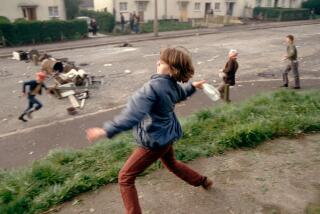Key Dates in a Troubled Past
1920: Ireland is partitioned. Six northeastern counties remain part of United Kingdom, with some self-government; southern 26 counties also given some self-government, but reject action and begin fighting for complete independence.
1921: Southern counties receive dominion status (self-governing country).
1937: Southern counties adopt new constitution, dissolving all remaining links with Great Britain. But the partitioning of Ireland remains a contentious issue for decades.
Oct. 5, 1968: Roman Catholics’ protests over apparent governmental favoritism of Protestants turn violent. Police attack civil rights marchers in Londonderry.
Aug. 12-15, 1969: Rioting breaks out in west Belfast. British troops deployed as peacekeepers.
December 1969: New “Provisional” IRA formed, initially to defend Catholic areas, but soon to go on offensive against police and soldiers.
Aug. 9, 1971: Parliament orders army to arrest, intern IRA suspects without trial, a disastrous policy that fuels Catholic support for IRA.
September 1971: Formation of Ulster Defense Association, umbrella for Protestant gangs that kill hundreds of Catholics in coming decades.
Jan. 30, 1972: Army kills 13 Catholics in day that becomes known as “Bloody Sunday.”
March 24, 1972: British government abolishes Parliament, assumes “direct rule” from London.
July 21, 1972: IRA kills nine, wounds 130 with 22 bombs in Belfast; dubbed “Bloody Friday.”
May 14-28, 1974: Power-sharing attempt fails. Three car bombs kill 31 in Irish Republic. Direct rule resumes.
April 9, 1981: Bobby Sands, leader of hunger strike in Maze prison, elected to British Parliament.
Nov. 15, 1985: British and Irish prime ministers sign Anglo-Irish Agreement giving Irish Republic role in shaping British policy in Northern Ireland. Protestants infuriated.
Oct. 23-31, 1993: Worst week of violence in Northern Ireland since early 1970s. IRA bomb kills nine Protestants. Pro-British gangs kill 13.
Dec. 15, 1993: British and Irish prime ministers offer Sinn Fein place in negotiations if IRA renounces violence.
Aug. 31, 1994: IRA declares “complete cessation of military operations.”
Dec. 9, 1994: British government opens “exploratory” dialogue with Sinn Fein, and UDA and Volunteer Force representatives.
Nov. 28, 1995: Two governments appoint former Sen. George Mitchell to resolve disarmament debate that has deadlocked peace process.
June 10, 1996: Current talks begin, chaired by Mitchell.
April 10, 1998: Agreement reached.
More to Read
Sign up for Essential California
The most important California stories and recommendations in your inbox every morning.
You may occasionally receive promotional content from the Los Angeles Times.










